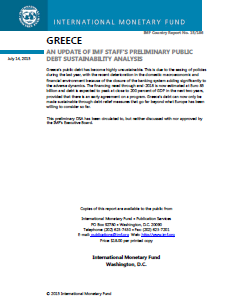Greece & the Eurozone - Part 2
Hector McNeill1
SEEL
The previous article on this topic (see Greece and the Eurozone - Part 1) concluded that no credible provision of incentives for growth to secure payments on a sustainable basis were apparent in the last troika proposal that the Greek government rejected. Of enormous concern to any normal and intelligent observer is that there appears to have been no particular concern that this proposal would exacerbate the state of the Greek economy and significantly prejudice the population of Greece.
The following Greek referendum also rejected this proposal and subsequent "negotiations" against a background of a closed Greek banking system a less viable proposal was "agreed". The behaviour of the IMF in this saga has been bizarre in its "habit" of making public critical and important analyses after decisions have been taken. It is time for the pressures that have been brought to bear to secure damaging decisions be assessed from the standpoint of the significant flaws in international monetary policies as well as economic theory which can only come up with "austerity" as the solution to such circumstances and to which "there is no alternative".
Well there is an alternative and this involves adopting a growth policy based on a Real Incomes approach which can bring about rises in real incomes within a relatively short period as well as growth and employment and repayment of debt more quickly. On the other hand, in spite of protestations from the North, there is a need to cancel some of the debt. The failure to yield on this question undermines the need for such questions to be brought more effectively within the domain of constitutional economics where Francis Hutcheson's four components of moral philosophy:
- ethics & virtue
- private rights & natural liberty
- familial rights (economics)
- state & individual rights (politics)
need to be given more weight in decision analysis to avoid the current practice of taking decision in a moral vacuum. |
The IMF does it again 
In the previous article (see
Greece and the Eurozone - Part 1) a box entitled
"IMF adds some common sense - sort of" explained that in a report
"Preliminary Draft Debt Sustainability Analysis" on Greece of 26th June 2015, published after the initial negotiations and before the Greek referendum, stated that Greece should have a 20-year grace period before making any debt repayments and final payments should not take place until 2055. It would need €10bn to get through the next few months and a further €50bn after that. Considering "possible" growth scenarios there might be a need for debt write-offs; as requested by the Greek government. However, the contents of this report were not shared with the Greek government during negotiations. See
this IMF report here Following this last negotiation, whose outcome is, in reality, worse that the first, the IMF has once again, after the event, published an additional report
"An update of the IMF staff's preliminary public debt sustainability analysis" of 14th July, 2015.

This report starts off with the words:
"Greece’s public debt has become highly unsustainable. This is due to the easing of policies during the last year, with the recent deterioration in the domestic macroeconomic and financial environment because of the closure of the banking system adding significantly to the adverse dynamics." |

The bizarre aspect to this IMF behaviour is that they make up part of the troika and therefore participate directly in the negotiations and it would seem that on both occasions their analysis of the situation was not made fully evident during the course of negotiations or their analysis on such an important topic was tardy or the other members of the troika do not take IMF analyses seriously. It might be that the analysts concerned are slow because they don't understand the urgency of upping their performance to have available critical information in a timely manner. There is another perspective, however, this is that, like the World Bank, IMF strategies are very much subject to US Government State Department oversight so there might be a degree of international politics muddying the waters. Either way, the IMF's behaviour helped to aggravate the relationship between the Greek government, the people of Greece and the troika. It is strange that all of this information had not been part of the negotiation exchanges so as to add more balance and due diligence to the proceedings. The talk of the "Eurogroup" not having sufficient trust in the Greek government pails at the disruptive impact of this selective management of critical information on the part of the IMF who is supposed to be a key participant.
The calamity of believing that there is no alternativeThe recent vote in the Greek Parliament ratifying this poor deal has taken place with no explanations of how productivity and growth are to be generated within the economy and the troika have been remiss in also not coming up with constructive suggestions. It is as if the people of Greece are not relevant in this saga but are expected to remain passive observers facing increasing prejudice. I set out in the previous article an option based on the Real Incomes approach which could raise productivity rapidly and effectively as well as improve the performance of the public sector. However, parliamentary debates, vote and negotiations continue to take place on lofty concepts rather than practical solutions. This state of affairs will continue as long as the troika and the Greek government invest so much time analyzing the situation on the basis of conventional economic theory and policies. These flawed models are what caused, in part, the current crisis and yet the conviction remains that there is no alternative. This will remain true as long as practical options are not considered simply because of ignorance or because they do not fit into conventional economic theory and policy options. The opportunity cost of this behaviour is an increased suffering of the people of Greece.
Constitutional economic issuesFrancis Hutcheson (1694-1746) identified the key components of a balanced consideration of factors of importance to moral philosophy as:
- ethics & virtue
- private rights & natural liberty
- familial rights (economics)
- state & individual rights (politics)
Indeed, Hutcheson's contributions were of course foreshadowed by many Greeks including Aristotle and Socrates. Socrates, being too outspoken in his quest for truth, was sacrificed by the "authorities". One of the democratic deficits that pervades the world and so-called democracies is the belief in the so-called "majority principle". However, under such a system, political parties win absolute power with minority electorate support. This allows powerful minority factions to impose policy on the majority. Such minority factional governments throughout Europe provide full support for decisions by institutions run by unelected officials and in terms of national politics and administration give support to extra-constitutional (See
"Extra-constitutionalism") bodies where factional interests oversee the conduct of their own affairs and avoid coming fully under the rule of law. The alternative to the majority principle is, paradoxically, the "minority principle"
1 (See
"The Minority Principle")where decisions can only be taken when all are in accord. The minority principle allows for the questions of ethics and virtue, private rights and natural liberty to enjoy as powerful a representation as familial rights expressed in terms of economics and state and individual rights expressed through politics. The Greek government attempted, through a referendum on a poor troika proposal, to redress the inequitable nature of the proposals. Even although the outcome was a more forceful imposition by the troika, this process proved to be alarmingly instructive in its exposure of the extremely inflexible nature of the troika.
Recently the "majority principle" has exposed the powerful minority interests when both in the Scottish referendum and the recent Greek referendum logic was substituted by threats in an effort to instill fear. This worked in Scotland but not in Greece because the government upheld its intention to remain within the Euro so the threat of being pushed out did not deter the voters. In both cases, however, the results might have been very different on the basis of a minority principle approach to voting where relevant facts become the essential weapons in a transparent arena for securing unanimous support one way or the other.
Restatement
 In the previous article I stated that when one speaks of growth, conventional economic logic tends communicate and quantify this in terms of nominal GDP. Greece has faced a decline in nominal GDP during the last 7 years in large part because of the extremely poor policy propositions accompanying the provisions of loans. The static "book balancing" proposed by the ECB and IMF reflect a blind, monolithic, out-of-date, inflexible nature of conventional theory and practice and the lack of awareness of options on the part of those concerned with debt repayments. Greece's main challenge is to increase productivity so as to secure growth in real incomes and real GDP. No conventional macroeconomic policy can achieve this without considerable delays, leakage, differential impacts on the social constituency and a general lack of traction. A Real Incomes policy such as Price Performance Policy (PPP) is the only practical means whereby Greece can secure its needs in the short term. This is achieved by basing gains in productivity on actual unit price moderation or reduction. PPP provides the incentives that encourage economic units and public services to moderate or reduce prices. This bolsters real incomes of consumers as well as those in performing economic units and public services through bonuses. PPP also secures real growth based on an effective redistribution of real incomes to lower income groups and generates employment (see The Real Growth Multiplier as well as Growth impetus).
In the previous article I stated that when one speaks of growth, conventional economic logic tends communicate and quantify this in terms of nominal GDP. Greece has faced a decline in nominal GDP during the last 7 years in large part because of the extremely poor policy propositions accompanying the provisions of loans. The static "book balancing" proposed by the ECB and IMF reflect a blind, monolithic, out-of-date, inflexible nature of conventional theory and practice and the lack of awareness of options on the part of those concerned with debt repayments. Greece's main challenge is to increase productivity so as to secure growth in real incomes and real GDP. No conventional macroeconomic policy can achieve this without considerable delays, leakage, differential impacts on the social constituency and a general lack of traction. A Real Incomes policy such as Price Performance Policy (PPP) is the only practical means whereby Greece can secure its needs in the short term. This is achieved by basing gains in productivity on actual unit price moderation or reduction. PPP provides the incentives that encourage economic units and public services to moderate or reduce prices. This bolsters real incomes of consumers as well as those in performing economic units and public services through bonuses. PPP also secures real growth based on an effective redistribution of real incomes to lower income groups and generates employment (see The Real Growth Multiplier as well as Growth impetus).
1 The Minority principle: Note that the link provided above only discusses some basic principles of the minority principle. A more complete discussion and legislative propositions to bring this into effect including policy solutions to overcome any persistent disagreements can be found in: McNeill, H.W., Chapter 23,
"The Minority Principle" pages 247-264, in
"The Briton's Quest for Freedom Our unfinished journey ..." 418pp, HPC, 2007. ISBN: 978-0-907833-01-7
All content on this site is subject to Copyright
All copyright is held by © Hector Wetherell McNeill (1975-2015) unless otherwise indicated